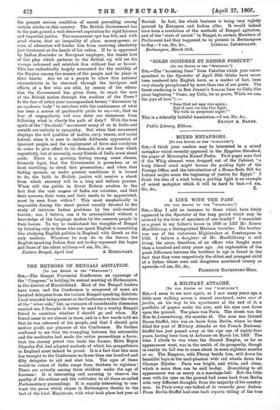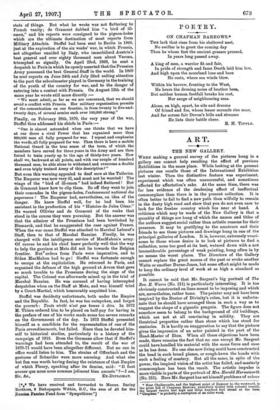A MILITARY ATTACHE.
[TO TUN EDITOR Or TUX Sr scraron..] SIR, I seem to see now again, as I saw many years ago, a little man walking across a stoned courtyard, entre cons et jardin, on his way to his apartment at the end of it, a portfolio of papers under his arm, and his eyes east down upon the ground. The place was Paris. The street was the Rue de Luxembourg, the number 41. The man was Colonel Baron Stoffel, who was on leave from Berlin, where he then filled the post of Military Attache at the French Embassy. Stoffel has just passed away at the ripe age of eighty-four years, having been born at Arbonne on March 1st, 1823. The time I allude to was when the Second Empire, as far as appearances went, was in the zenith of its prosperity, though in reality its fall was to come about in some eighteen months or so. The Emperor, with Fleury beside him, still drove his beautiful bays in the mail-phaeton with red wheels down the Champs Elysees. Paris was bright, and white, and clean, which is more than can be said to-day. Everything to all appearances was as merry as a marriage-bell. But the little man with his eyes on the ground had come back from Berlin with very different thoughts from the majority of his country- men. In Paris every one talked of. in revanche your Sadora. From Berlin Stoffel had sent back reports telling of the true
state of things. But what he wrote was not flattering to French vanity; de Gramont dubbed him "a bird of W- omen," and his reports were consigned to the pigeon-holes which are the ultimate destimition of most reports from Military Attaches. Stoffel had been sent to Berlin in 1866, just at the expiration of the six weeks' war, in which Prussia, not altogether unaided by Italy, who immobilised Austria's best general and over eighty thousand men about Verona, triumphed so signally. On April 23rd, 1868, he sent a despatch to Paris in which he openly asserted that the Prussian Army possessed the beat General Staff in the world. In 1869 he sent reports on June 24th and July 22nd calling attention to the part the schoolmaster played in Germany in the training of the youth of the country for war, and to the danger of entering into a contest with Prussia. On August 12th of the same year he wrote still more directly :-
" We must admit, as far as we are concerned, that we should avoid a conflict with Prussia. Her military organisation permits of the concentration on our frontier, in from twenty to five-and- twenty days, of several armies each over 100,000 strong."
Finally, on February 28th, 1870, the very year of the war, Stoffel thus addressed his chiefs in Paris :-- " One is almost astounded when one thinks that we have at our doors a rival Power that has organised more than 900,000 men all fully prepared for war. I repeat and emphasise the words, all fully prepared for war. Then there is here a mobile National Guard in the true sense of the term, of which the members have served for three years in the Army and are then forced to train yearly up to the age of thirty-two years. How shall we, backward at all points, and with our couple of hundred thousand men, be able alone to withstand and overcome a double and even triply trained Army of this description?"
But even this warning appealed to deaf ears at the Tuileries. The Emperor was now very ill, and must not be worried ! The wings of the "bird of ill-omen" had indeed fluttered ! But de Gramont knew how to clip them. So off they went to join their comrades in the pigeon-holes, rentassement national des paperasses ! The Emperor had, nevertheless, an idea of the danger. He knew Stoffel well, for he bad been his assistant in the production of his " Histoire de Jules Cesar." He warned 011ivier and de Gramont of the rocks that stood in the course they were pursuing. But the answer was that the admirer of the Prussians had been bewitched by Bismarck, and that he exaggerated the case against France. When the war came Stoffel was attached to Marshal Lebceuf's Staff, then to that of Marshal Bazaine. Finally, he was charged with the intelligence service of Machfabon's army. Of course he and his chief knew perfectly well that the way to help the garrison at Metz did not lie towards the Belgian frontier. But*orders from Paris were imperative, and to Sedan MacMahon had to go ! Stoffel was fortunate enough to escape at the capitulation. He returned to Paris, and organised the defence of the high ground at Avron that gave so much trouble to the Prussians during the siege of the capital. The Colonel was afterwards mixed up in the trial of Marshal Bazaine. He was accused of having intercepted despatches when on the Staff at Metz, and was himself tried by a Court-Martial, which honourably acquitted him.
Stoffel was decidedly unfortunate, both under the Empire and the Republic. In fact, he was too outspoken, and forgot the proverb : Touts verith n'est pas bonne a dire. In 1872 M. Thiers ordered him to be placed on half-pay for having in the preface of one of his works made some too severe remarks on the Government of the day. In 1873 Stoffel presented himself as a candidate for the representation of one of the Paris arrondissements, but failed. Since then he devoted him- self to historical studies, particularly to a history of the campaign of 1815. Even the Germans allow that if Stoffel's warnings had been attended to, the result of the war of 1870-71 would have been altogether different. But no one in office would listen to him. The strains of Offenbach and the gestures of Schneider were more amusing. And what else but fun was worth having during the existence of that Empire of which Fleury, speaking after its demise, said: "11 faut avower que nous nous sommes joliment Bien amuses " P-1 am,



























































 Previous page
Previous page